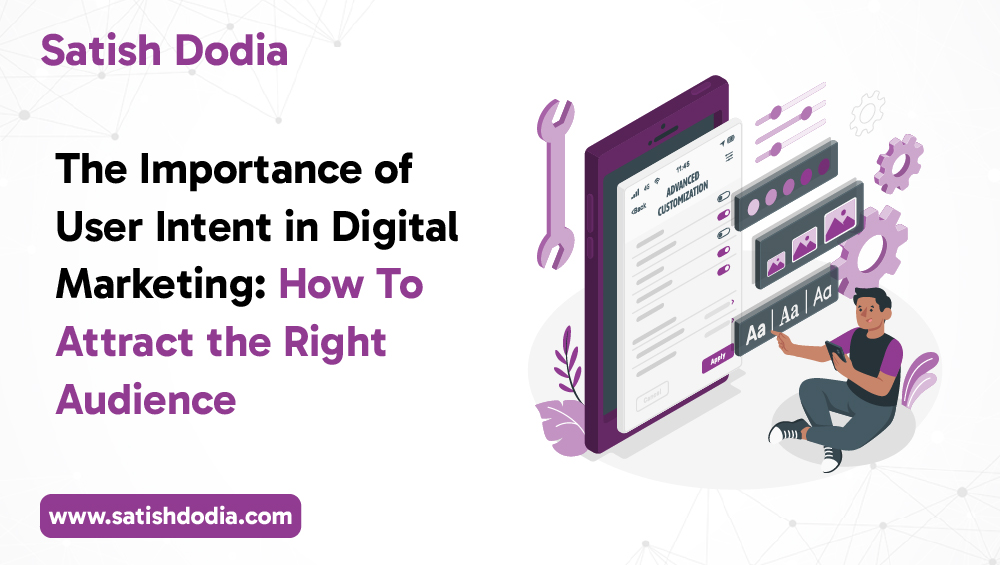In today’s fast-moving online world, businesses don’t just need traffic — they need the right traffic. Reaching the wrong audience wastes time, money, and effort. This is where user intent becomes the game-changer in your digital marketing strategy.
Understanding what your audience truly wants helps you create targeted content, run effective ads, and turn clicks into customers.
Whether you’re a startup or a brand working with a digital marketing agency, knowing user intent can make or break your online success.
What is User Intent in Digital Marketing?
User intent refers to the reason behind a person’s search or online action. When someone types a query into Google, they have a goal — it could be to find information, compare products, or make a purchase.
Your marketing strategy should match that goal.
Types of User Intent
- Informational Intent – User is looking for answers or guidance.
Example: “What is digital marketing?” - Navigational Intent – User wants to reach a specific website or brand.
Example: “Satish Dodia digital marketing services” - Transactional Intent – User is ready to take action, like buying a product or booking a service.
Example: “Hire best digital marketing agency in India”
Why User Intent Matters for Your Marketing Strategy
- Better Search Rankings – Google’s latest algorithm prioritizes content that matches search intent.
- Higher Conversion Rates – When you give users what they’re looking for, they’re more likely to convert.
- Improved User Experience – Intent-based content keeps visitors engaged.
- Reduced Bounce Rate – Relevant information means users stay longer.
How to Identify User Intent
Here’s how you can decode what your audience wants:
- Analyze Search Queries – Use tools like Google Search Console, SEMrush, or Ahrefs.
- Check SERP Features – Look at what’s ranking for your target keywords (blogs, product pages, videos).
- Study Competitors – See how top-ranking pages satisfy intent.
- Use Customer Feedback – Surveys, chats, and reviews reveal user needs.
How to Attract the Right Audience Using User Intent
1. Map Content to Intent
- Informational → Blog posts, guides, videos
- Navigational → Brand-focused landing pages
- Transactional → Product pages, service details, pricing
2. Use Long-Tail & Semantic Keywords
- Instead of just targeting digital marketing, use “digital marketing agency in India for startups” or “affordable digital marketing services in India”.
3. Optimize for Google’s Latest Algorithm
- Use topic clusters (related subtopics under one main theme)
- Focus on E-E-A-T (Experience, Expertise, Authoritativeness, Trustworthiness)
- Create mobile-friendly, fast-loading pages
4. Personalize Your Messaging
- Address pain points directly.
- Speak in simple, relatable language.
5. Leverage Local SEO for Indian Audience
- Add location-based keywords like “Best Digital Marketing Agency in Mumbai” or “SEO Services in Ahmedabad.”
Example of User Intent in Action
Imagine you’re a digital marketing agency in India.
If a user searches “best ways to get leads online” — you should create an informational blog explaining strategies and then offer your lead generation services as a call-to-action.
This way, you match intent and guide them toward becoming a customer.
Role of a Digital Marketing Agency in Understanding User Intent
A skilled digital marketing agency can:
- Research and map audience intent
- Build campaigns for each stage of the customer journey
- Optimize content for faster indexing and higher rankings
- Track performance and adjust strategy
Checklist for User Intent-Based Marketing
Research keywords and intent before content creation
Create content for all stages — awareness, consideration, decision
Optimize meta titles & descriptions for intent keywords
Use schema markup for better SERP visibility
Monitor engagement metrics
FAQs
Q1: How does user intent affect SEO rankings?
Matching your content to user intent helps Google understand relevance, improving rankings.
Q2: Can a small business benefit from intent-based marketing?
Yes. It ensures your efforts reach the right audience, giving better ROI.
Q3: How fast can I see results from intent-focused strategies?
You can see improvements in engagement and rankings within weeks, depending on competition.
Q4: What tools help identify user intent?
Google Search Console, Ahrefs, SEMrush, and direct customer feedback are highly useful.
Conclusion
Understanding and targeting user intent isn’t just an SEO tactic — it’s the foundation of a winning digital marketing strategy. By aligning your content, ads, and offers with what your audience actually needs, you can attract the right audience and turn clicks into long-term customers.
If you want to grow faster and smarter, partner with a digital marketing agency that understands the Indian market and focuses on intent-driven results.
